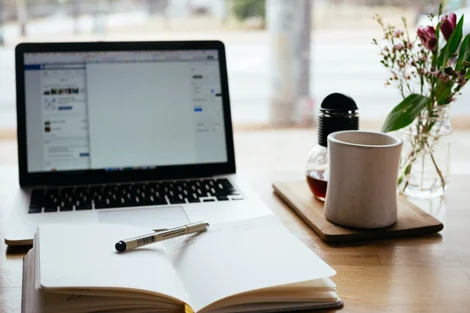
How to Manage Stress at Work
SHARE

Although work often has a positive impact on our lives, giving us purpose and challenging us to be better, sometimes it can overwhelm us.
Whether it’s a boss that undermines us, a client that is dissatisfied with our work, or just a general feeling of unease in the office environment, we can end up feeling quite stressed and down on ourselves. As many will recognise from first-hand experience, the state of feeling stressed at work is one we often drift into overtime. In the worst scenarios, office stress spills over into our general lives, exhausting us at all hours of the day.
But while there are some work situations that may just be impossible to deal with, 99% of the time there are things that we can do to control the way we feel.
So, if you’re wondering how to manage stress at work, read our guide.
How To Manage Stress At Work
As most people know, there is no magical solution to make us feel confident and at ease when we are at work. Instead, we have to fight stress on a number of different fronts, taking practical steps both at work and outside of it. Here are the steps you should really be focusing on.
1. Start Managing Stress Before Your Get to Work
First things first, if you are feeling stressed at work, you need to try to avoid the trap of waiting to get to work to sort the stress out. If in your time away from work you sleep badly, eat poorly, don’t exercise, avoid social occasions, and live on the couch watching Netflix, then you really don’t have a chance at beating stress once you do get to work.
Of course, most people aren’t doing all of these things, but even if one or two of them have weaselled their way into your weekly rhythm, they can seriously undermine your capacity to cope with office stress.
Usually, the problem is cyclical. If we feel stressed at work, we are more likely to sleep poorly or avoid exercise, which is inherently a stress-inducing activity (even though it is stress-reducing once it’s done).
Similarly, when we feel stressed we are more likely to seek out unhealthy foods high in fat and sugar because their high-calorie content triggers a short-term serotonin release. And in just the same way, we can be drawn to a night-time binge session on Netflix as a stress-avoidance strategy, one that usually ends up backfiring when we get down on ourselves afterwards for not having done anything truly fun or productive with our time.
Of course, it’s a great thing to be kind to ourselves and watch the odd movie or eat the odd chocolate bar. But being kind to ourselves also means getting good sleep, feeding ourselves nutritious food, and boosting stress-reducing hormones through exercise and socialisation (not just watching a screen).
A good way to make sure we are being kind to ourselves in the right ways is to build some structure into our off-time—planning meals ahead of time, organising regular social meet-ups, and exercising according to a schedule, for example.
However you cut it, you’ve got to be looking at office stress through a very broad frame. There might be difficult things going on in the office, but you’ve got to put yourself in the right position to deal with them.
2. Give Yourself Something to Look Forward To
One of the things that can make us most anxious in the workplace is the feeling that the days are so very long, meaning that there is no escape from the build-up of pressure. So, we need to be proactive in breaking ourselves out of this thought pattern before we dip into a trough from which we can’t escape.
The easiest way to deal with this type of stress is to break the routine of our daily or weekly schedule by giving ourselves things to look forward to.
One way to do this is to organise events throughout the week that we can get excited about. In particular, being proactive in setting up social occasions (rather than just going home to slump on the couch) can give us a real emotional boost.
But it can also be useful to break up the workday itself. One very simple strategy is to give yourself a nice lunchtime meal at your favourite eatery to look forward to, particularly if it’s with a friend or colleague. Or, you might reward yourself at your desk by playing a favourite song after each block of work you get through.
Another great way to break up the monotony of your workday is to exercise!
3. Exercise, Exercise, Exercise
Not enough can be said about exercise, in terms of its power to knock stress on the head (as well as keep you happy and more energised in general).
The evidence is very clear.
First off, doing exercise has the immediate effect of releasing a number of endorphins in your body. An endorphin is a kind of ‘happy’ neurotransmitter that your body produces in response to the physical stress of a workout.
It’s probably the closest thing we have to a magic bullet that kills stress.
Unfortunately, office workers are very prone to believing that they don’t have the time or energy to exercise. True, it’s very difficult to wake up at 5 in the morning to get to the gym, then have a shower and breakfast and get into the office by start time. Likewise, after a long day of looking over contracts or editing a new policy document, it’s easy to feel that you simply don’t have the physical energy required to go for a run, play a spot of tennis, or lift some weights.
The first thing to say in response to this is that, usually, our bodies really are capable of undergoing strenuous activity at the end of a workday. In fact, exercise has paradoxically been shown to boost our energy levels because it spurs the body into producing more mitochondria and increasing oxygen supply.
The second point to note is that you also don’t need a whole lot of time to get the stress-busting benefits of exercise. For example, you really don’t need to hit the pavement for 10km or get into the gym for an hour.
Particularly if you do more intense exercise, short intervals are enough to get those feel-good chemicals pumping in your system. A ten minute run before breakfast or at lunchtime, for example, will boost your energy and mood throughout the day.
Other than that, try to get exercise wherever you can. Instead of just eating at lunchtime, why not go for a walk in the sun?
It all adds up.
4. Meditation
Meditation in the workplace may seem like a bit of a fad. But in order to meditate in the office, you don’t need to be whipping your yoga mat out in the breakroom or greeting your coworkers with the word namaste while smiling placidly.
Meditation is something that can be done at your desk, even without the people around you knowing you’re doing it.
It also doesn’t need to last for much time at all. Research has shown, for example, that even a single 15-minute session of meditation decreases mind-wandering, on average by 22%. This is good news if the stress you’re feeling at work is derived from a sense that you aren’t being productive enough.
But meditation also addresses office stress much more directly.
The basic principle of meditation is that by forcing your mind to focus on something very simple, you can reduce the stress caused by the constant stream of thoughts that most people feel from moment to moment.
Of course, it’s completely normal for our minds to be constantly juggling all sorts of different thoughts at the same time (such as when you’re trying to think about how to edit the wording of a contract while at the same time thinking about your boss’ possible reaction, what you’re having for lunch, whether your weekend plans will go ahead or not, etc., etc.). The problem comes when our minds get overloaded with information, particularly of the negative kind.
So, the goal is to calm ourselves and bring order to our thoughts.
The simplest form of meditation is just to focus on your own breath. Nothing mystical about that—just concentrate on the process of breathing for 5-20 minutes and feel your mind declutter.
In a busy office space, this might seem impractical. But it’s easy to get around that by chucking on your headphones and listening to white noise on Youtube—something like raindrops or radio static, for example. Listening to white noise is a kind of meditation in itself because it has the effect of blocking out lots of different, cluttered sounds, allowing your brain to focus on a single, constant sound. This is why it has been shown to help people fall asleep more quickly.
If white noise isn’t your thing, then a piece of soft music (preferably without lyrics) can work. And of course, you can find lots of free guided meditation sessions on the internet which often have peaceful music to accompany them.
Beyond reducing short-term stress, meditation comes with all sorts of long-term benefits ranging from physical health to emotional wellbeing.
However silly you might feel, give it a go.
5. Breathing Exercises
Breathing exercises are in one sense a form of meditation. But even if you aren’t trying to get your mind to a zen state by focusing on the rise and fall of your chest, breathing exercises can reduce stress in a simpler way.
The way to do this is with deep-breathing techniques.
Deep breathing works to reduce stress on a number of levels. In the first place, making sure your lungs fill with oxygen has the effect of physically making the muscles in your chest and abdomen less tense. We often think of stress as a psychological phenomenon, but you can’t separate it from its physical manifestations.
Another way that breathing exercises affect us physically is by reducing our heart rate. This is because, with deeper breaths, our lungs start to supply much more oxygen to our blood, meaning the heart has to work less hard. Added to this is the benefit that breathing exercises have been shown to have an immediate impact on blood pressure.
So, ten deep breaths… Go!
6. Progressive Muscle Relaxation
Progressive muscle relaxation is not quite as well known as techniques like meditation and breathing exercises. But it’s another scientifically proven method of reducing stress by addressing its physical symptoms, while also forcing your mind to block out unhelpful thoughts.
The way PMR works is that a person goes through a process of tensing and relaxing each of the muscles in their body according to a specific pattern. Generally, the pattern is to begin with your toes and steadily progress to your facial muscles. You can find a number of guided videos online to help you.
As with the physical relaxation that deep breathing provides, PMR obviously works to relax your whole body so that you are experiencing less of the distracting discomfort of bodily tension caused by stress (when we are stressed, we often don’t even realise how tensed our muscles are).
But also, PMR, just like meditation, forces our mind to focus on something simple and entirely separate from the stresses of work. Going through the progression has the effect of making your mind focus deeply on the physical sensations your body is feeling, particularly the sensation of physical tension being released.
Best of all, you can do it at your desk!
Embrace Your Stress
Apart from all of the tangible things we can do to avoid stress that we’ve discussed above, it’s also important that we get ourselves together psychologically. Now, when we think about the stress we are experiencing at work (as in any aspect of life), there are two main reasons why we are unable to deal with it mentally.
The first is that one of our natural psychological responses to any given stressor is to put it out of our minds completely. Not dwelling too much on an object of anxiety is obviously important. But humans can take it too far sometimes, telling themselves that they don’t feel any stress when really they do—and this can actually cause more stress when we are finally forced to face up to what is stressing us out.
The second psychological issue is the opposite of the first: we end up spending all of our hours away from work thinking about work, ruining our rest time and compounding the issue itself.
Whether you’re pretending the stress doesn’t exist or letting it rule you, psychologists believe the best way forward is to find a middle ground where you actually accept and embrace the fact that you are feeling stressed.
So, do the practical things to reduce the stress you feel from day to day, but don’t get down on yourself for not feeling totally okay.
Related articles


Five Ways to Prioritise Tasks and Manage your Workload


